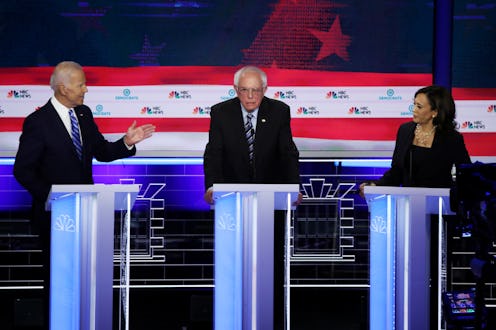
As the second night of the Democratic debate went on, an especially memorable moment took place between two major 2020 presidential candidates. Kamala Harris called out Joe Biden over his record on busing and race, and shared her own personal story. “There was a little girl in California who was part of the second class to integrate her public schools, and she was bused to school every day," she said. "And that little girl was me."
It started after Pete Buttigieg talked about a white police officer who shot an African American man while his body camera was off. After delivering his remarks, Harris interjected, "As the only African-American on stage, I would like to speak."
At this point, Harris turned to Biden and said, "I do not believe you are a racist and I agree with you when you commit yourself to the importance of finding common ground, but I also believe, and it's personal, and it was hurtful to hear you talk about the reputations of two United States senators who built their reputations and career on the segregation of race in this country."
Pointing to Biden's record of opposing the Department of Education from integrated school busing in the 1970s, Harris said that his position hurt a little girl in California. "That little girl was me," she said. "So I will tell you that on this subject, it cannot be an intellectual debate among Democrats. We have to take it seriously. We have to act swiftly." On Twitter, as the debate went on, Harris' official account posted an image of her from her childhood.
Additionally, Harris also spoke frankly about racial profiling in the United States. "There is not a black man I know, be he a relative, a friend or a co-worker who has not been the subject of profiling or discrimination. My sister and I had to deal with the neighbor who told us her parents couldn't play with us because we were black," she said.
To be clear, Biden attempted to respond to Harris' remarks. The former vice president said that he would not tolerate a "mischaracterization of [his] position across the board."
"I do not praise racists. That is not true," Biden retorted. "Number two, if we want to have this litigated on who supports civil rights, I'm happy to do that. I was a public defender. I was not a prosecutor. I left a good firm to become a public defender when, in fact, my city was in flames because of the assassination of Dr. King."
In his attempt to fire back at Harris, Biden also said, "Everything I have done in my career, I ran because of civil rights and continue to think we have to make fundamental changes and those civil rights, by the way, include not just African Americans, but the LGBT community."
This clearly did not sit well with Harris who asked Biden if he felt that he was wrong for pushing against busing. "I did not oppose busing in America. What I opposed was busing ordered by the Department of Education ― that’s what I opposed," Biden responded.
A resolute Harris then responded, "There are moments in history when states fail to preserve the civil rights of all people." The California senator said that that's when the federal government should get involved.
This exchange between Biden and Harris may very well have been one of the most dramatic — and notable — moments of the night. Though the controversy surrounding Biden's history on busing reached its boiling point on Thursday, it's unlikely that'll be the last you hear about it.